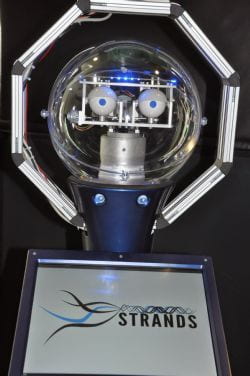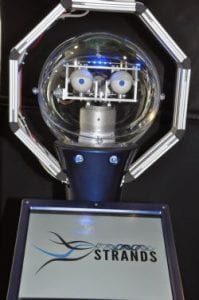Computer scientists to contest ‘World Cup’ of robotics this summer
4 May 2017
Computer scientists leading pioneering robotics research in the UK have been selected to take part in the ‘World Cup’ of robotics, which will be held in Japan this summer. As part of an international team consisting of experts from the University of Lincoln, UK, and the Sapienza University of Rome in Italy, the researchers will […]

 Computer scientists leading pioneering robotics research in the UK have been selected to take part in the ‘World Cup’ of robotics, which will be held in Japan this summer.
Computer scientists leading pioneering robotics research in the UK have been selected to take part in the ‘World Cup’ of robotics, which will be held in Japan this summer.
As part of an international team consisting of experts from the University of Lincoln, UK, and the Sapienza University of Rome in Italy, the researchers will pit themselves against other elite teams of robotic developers from around the world at RoboCup 2017.
RoboCup 2017 comprises five different leagues – each testing a different area of robotics. The joint Lincoln and Rome team, called SPQReL (pronounced ‘sparkle’), is one of 12 international groups selected to take part in the RoboCup@Home league, which challenges participants to develop service robots with domestic applications.
Each team in the RoboCup@Home league will receive a humanoid ‘Pepper’ robot, and the teams will programme their robot with their own software systems so that it can carry it out everyday tasks in a home environment. One challenge the teams will face is programming their robot to successfully serve guests at a cocktail party, with the robots required to autonomously navigate around people, make conservation, and serve food and drinks.
They will be judged on a number of factors, including human-robot-interaction and cooperation; navigation and mapping in dynamic environments; computer vision and object recognition; and ambient intelligence.
The Lincoln researchers have extensive experience of developing mapping, navigation and human detection capabilities for service robots as part of their innovative STRANDS, ENRICHME and FLOBOT research projects, while scientists at the Sapienza University of Rome specialise in speech recognition.
The SPQReL team includes Dr Marc Hanheide, Dr Jaime Pulido Fentanes and Dr Heriberto Cuayahuitl from the University of Lincoln’s School of Computer Science. They have already competed in a number of European Robotics League (ERL) competitions and recently picked up an ERL Service and Industrial Robots accolade the euRobotics Awards Ceremony at the National Museum of Scotland, in Edinburgh.
Dr Hanheide said: “We are delighted to be taking part in the prestigious RoboCup for the first time. These international competitions represent fantastic opportunities to bring all of the different components of our robotics research together, and to stress test them by asking our robots to perform real-world tasks in realistic domestic environments. Every task that our robots perform at a competition has to be completely autonomous, and this aspect is ultimately the biggest task for all AI developers around the world.”
The success of the SPQReL team follows a highly prestigious competition win by another University of Lincoln computer scientist in the Mohamed Bin Zayed International Robotics Challenge (MBZIRC) – a global outdoor robotics competition which took place in Abu Dhabi and featured the work from some of the best universities in the world. Other competitors included Imperial College London, ETH Zurich, Carnegie Mellon University and the Georgia Institute of Technology. Hosted by Sheikh Hamed Bin Zayed Al Nahyan, the challenge aims to inspire robotics innovation and has total prize money and team sponsorship of five million US dollars. This year, almost 150 teams applied to take part but only 25 were selected to participate.
Dr Tomas Krajnik from Lincoln’s School of Computer Science worked as part of a respected international team with colleagues from the Czech Technical University in Prague and the University of Pennsylvania, USA. Together they won three medals in the competition – a gold, a silver and a bronze.
The competition is motivated by the technological challenges facing the next generation of robotics and it explores the potential for robotic applications in disaster response, the oil and gas, manufacturing and construction industries, and supporting household tasks.
Dr Krajnik’s team picked up top prize in the third challenge, in which a team of cooperating autonomous drones had to locate, track and pick up stationary and moving objects, and carry them to a designated location. The team used cutting-edge methods of artificial intelligence, machine vision and cybernetics to ensure the drones could perform the required task in difficult weather conditions.
Dr Krajnik said: “MBZIRC represents one of the most important robotics competitions in the world so to come away with three medals is a fantastic achievement for our team. With specialists from all over the world competing to push robotics to new heights, it is a great opportunity to see where technological innovation could take us in the future.”
